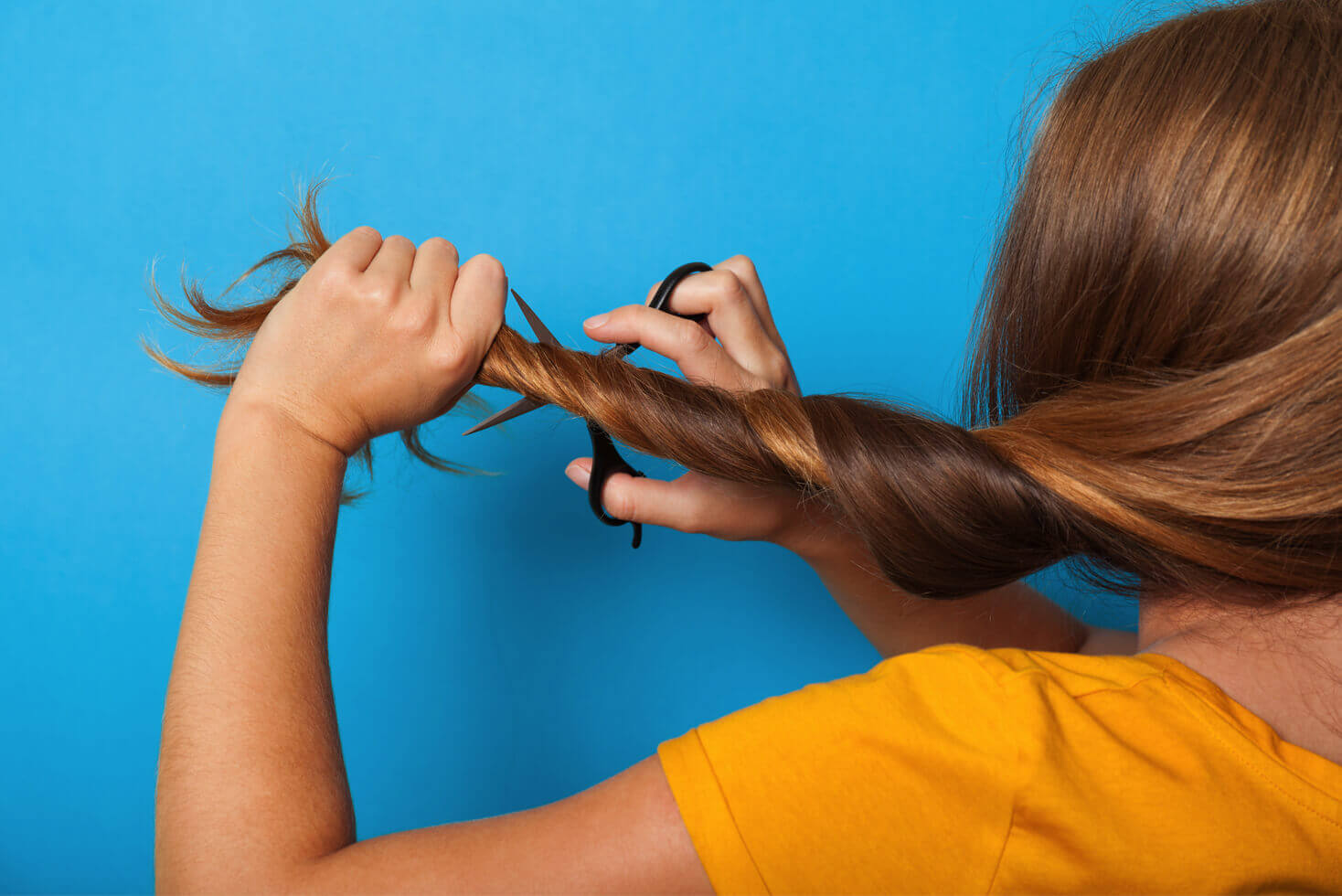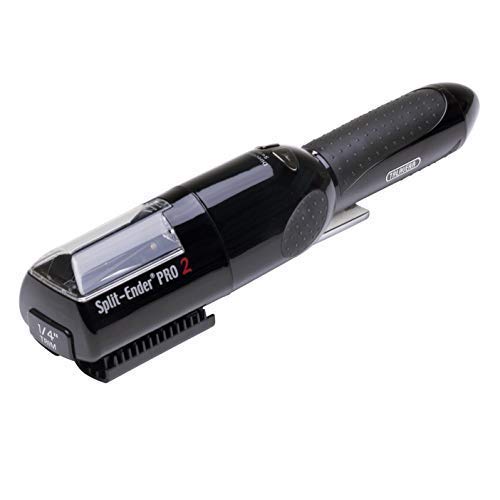What Happens if You Don’t Cut Your Split Ends Regularly?
Updated on
This post may contain affiliate links. As an Amazon Associate, we may earn from qualifying purchases.

Here’s what happens if you don’t cut your split ends when it’s due:
The splits work their way up, damaging more than just the ends, causing breakage, frizz, and scraggly strands that refuse to blend with the rest of your hair.
If left unkempt, split ends eventually become more of a hassle to manage than simply not cutting them in the first place.
So if you are still holding on to them, let me put this bluntly to you:
I’d rather have short healthy hair than long hair that’s splitting.
Why?
Because the tip is the oldest part of the hair strand where the fiber starts to flake and break off.
That part of the hair has reached the limit of its growth cycle and adds no value to the healthy part of the hair strand.
Besides being unsightly, split ends make your hair condition worse.
So here’s what happens when you don’t cut your split ends regularly …
1. Split Ends Work Their Way Up, Causing More Breakage
Once your ends begin to split, the damage only progresses.
Splits in hair slowly move upwards, causing more fissures, splints, and fractures towards the middle of the healthy part of the hair.
As a result, your hairs are more likely to break higher up.
Check this illustration below to see how a small split can manifest into a bigger problem in one single hair strand.

Now imagine what happens when most of your hairs are splitting and have not been trimmed for a while!
You’ll experience a lot of hair breakage, leading to an overall lack of volume and potentially thinning hair from the top.
How far can split ends travel?
On average, split ends can travel up to -3 inches.
What happens if your split ends reach your scalp?
It’s very unlikely that your hair will fray all the way to the scalp. A split end will stop at the healthiest part of the hair strand, which is around the middle.
2. You Lose Hair Density
Although your hair won’t be shedding from the roots, it will keep splitting into 2, 3, or more, eventually reaching the middle part of the hair.
When individual hair fibers split from the rest of the pile, you could be losing more than the average 50-100 hairs a day.

So if you start noticing that you have less and less hair to play with when styling, chances are, those ragged edges are slicing away a lot more of your hair strands.
3. You Notice Less Growth

Once your hair starts to break higher up, you’re essentially losing a lot more inches from healthy hair strands that could have grown longer.
Fraying ends makes your terminal length (the longest you can grow a hair strand) appear shorter. As a result, you’ll notice less growth and less length retention, which can be frustrating.
If you cut your split ends regularly, you’re giving your hair strands every chance of growing as long as they can by not risking the entire length with fragile ends that can travel up.
4. Your Hair Texture Will Feel Rough and Coarse
As the split ends continue to rise, they dry out the rest of the hair, leaving them feeling rough and coarse all around.

Once they form in abundance throughout your mane, your hair will feel increasingly crunchy, dry, and stiff, and these dry and parched ends can’t hold on to moisture anymore due to their highly porous texture.
5. Your Hair Tangles Easily

Splitting ends make your hair more ratty and tangly because the strands aren’t as smooth as the rest of your hair.
As a result, your comb or hairbrush will not glide effortlessly.
You’ll always end up with some raggedy parts and fairy knots that can either spark a fire in your brush or explode your hair into a frizz ball.
So if your ends are dry, damaged, and in desperate need of a trim, brush gently when your hair is wet. Never brush on dry hair.
6. The Splits Will Multiply
The longer you leave them, the more you will see the splits multiply, leading to more ugly-looking tips like the triple, feather, and the tree ends.

You don’t want to be looking like the sheepdog having a bad hair day!
7. The Ends Will Look Lighter In Color
If your hair is colored, your ends will start looking lighter than the rest of the hair due to dryness.
Due to wear and tear, environmental factors like sun exposure, the most fragile parts of the hair cannot hold on to the color like the healthiest parts.
As a result, you’ll notice more color fade towards the ends, which won’t blend with the rest of your mane.
How Can You Stop Getting Split Ends?
You cannot literally stop split ends, but you can keep them under control by not over manipulating your hair.
Here are a few things you can do to calm them until your next trim.
- Be gentle when washing, detangling, or styling
- Avoid using heat tools often
- Use deep conditioning/oil repairing treatments once every 1-2 weeks
- Avoid drying your hair on a harsh cotton towel
- Protect your hair overnight with a satin or silk pillowcase
- Find hair products without harsh chemicals
Being more gentle with your hair will lessen damage because rough handling causes split ends and unnecessary wear and tear, leading to hair loss.
Can Split Ends Go Away On Their Own?

If you had any lingering hope that there would be a method to get rid of split ends without having to bring out some scissors …
I hate to be the bearer of bad news, but the only way to get rid of split ends is to cut them off.
To better understand, here’s an example:
If you drop an apple and one part of it gets bruised, the damage is done.
The bruised area cannot repair itself, so the only way to get rid of the bruise is to chop it off, so you are left with the healthy part of the apple to eat.
It may be difficult to sacrifice some length, but you are helping your hair out dramatically in the long run.
The Best Methods for Trimming Split Ends
The easiest and most convenient way to slay your split ends without making a mess is to use a splits ends trimming tool like this:
The Split Ender Pro
Renew dry, brittle, and damaged hair without losing the length.
This tool removes splits and damaged hair ends with a high-precision ¼ inch adapter while leaving the healthy part of the hair untouched.
It helps strengthen future strands that might otherwise break apart with daily natural wear and tear from heat and styling tools.
Use Hot Scissors

Most hair stylists suggest using hot scissors instead of regular ones.
A traditional scissor opens the cuticle and leave the hair prone to stress that can cause frizz and dryness. A Heated Scissor, on the other hand, melts and seals the tip after cutting to trap in moisture. This is also known as the Thermo Cut.
It is the same idea when cutting the end of a rope. The ends would fray and unravel unless the tip is melted.
The added heat seals in hydration and ensures the ends are protected from damage, preventing split ends.
Tip:
Always cut the strand above the highest split.Seal Them
If you are not comfortable trimming your ends at home, use sealers a split end therapy treatment to smooth them over until your next visit to your stylist.
Don’t keep them in an unhealthy state, as they will only get worse.
Recommended: GHD split ends therapy.Quick DIY Methods To Seal Split Ends
Vaseline
Vaseline is an excellent sealant that can help cover the ends of the hair that has become dry and crimped.
But bear in mind, it’s only a temporary solution to smooth down your frizzy ends. Don’t overdo it.
Coconut Oil
Coconut oil can also help conceal your frayed ends for a short while in between your salon appointments.
I would usually apply a small amount and work it in my hair from the ends to mid-shaft. Then I put my hair up in a low-maintenance hairstyle.
How Often Should You Trim Your Split Ends?
Getting regular trims will help to keep your hair healthy. Michael Fuzailov, owner of Poiz Beauty Salon, says the average time frame between cuts is “every 3 to 4 months.”
Even if you are looking to grow your hair out, regular trims about every 12 weeks are essential to keep your hair in optimum condition.
Regardless of how quickly your hair tends to grow, getting in the salon to clear out any dead hair restricting the rest of your locks will leave you with the best results!
It is safe to say that a good majority of us had some fun exploring our hair-cutting abilities. Still, I would recommend getting your hair trimmed by a professional if possible.
Make Sure You Dust Your Dead Ends!
Make sure you stick to a regular schedule for trimming your split ends.
Putting this off could result in inches needing to be taken away, which nobody wants.
Nobody wants to be growing their hair out for months on end but end up with no growth in their hair’s appearance because of stubborn split ends.
There is absolutely no point hanging on to them because your hair grows from the roots, not at the ends.
About the Author
 Shehnaz Shirazi
Shehnaz ShiraziShehnaz Shirazi has been writing in the beauty and cosmetics industry for over 8 years, sharing her expansive hair care and beauty knowledge. Shehnaz researches and tests new hair care trends and publishes her insights here.
